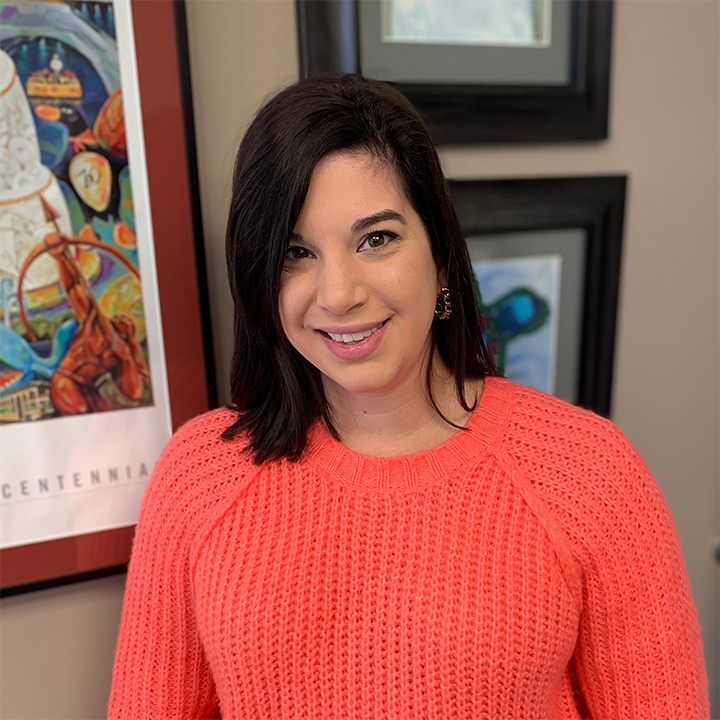
Meet Sara Mahan, Outpatient Services Program Manager
Friday, November 6, 2020
Sara Mahan was recently named Program Director of the Year by Counseling and Recovery Services of Oklahoma (CRSOK). In 2015, she graduated from Oklahoma State University with a master’s in counseling, equipping her to become a licensed professional counselor. Mahan has worked for CRSOK for more than five years and advanced to a supervisory role.
How have your responsibilities changed over time at Counseling and Recovery Services of Oklahoma?
I started as a case manager for adults, and after graduating with my master's degree, I became a therapist with children. In 2017, I completed the hours needed to become a licensed professional counselor (LPC), which allowed me to become a lead therapist - supervising staff while maintaining a caseload of clients.
Because I started as a case manager and grew within this role, I can relate with my staff and help support their work. I have grown in learning how to write procedures and help create policies and provide competent and effective supervision. I also continue my own education in treating individuals with various mental health diagnosis to better support the staff who are working directly with clients.
What are your day-to-day responsibilities as an outpatient services program manager?
My duties range from monitoring curriculum used in our school program to managing administrative tasks and mentoring clinicians in better supporting their clients. I provide individual clinical supervision to 14 staff, so I also quality check client's notes and provide feedback to the staff. I help clinicians learn how to document and diagnose in the most effective and confidential way and create processes to assist staff across the agency in understanding workflows and curriculum.
What do you wish more people knew about counseling and mental health?
I wish people knew you could receive counseling before you feel depleted and are at a "10" scale of symptoms like depression, anxiety, anger, marital issues, family issues, interpersonal issues. Counselors truly are there to help guide, process and resolve what a person is managing through collaborative effort.
Additionally, feeling the stigma of “I can't ask for help,” or “It's wrong to struggle with my mental health” does not give a person dignity and hope. Counseling should restore a person's dignity and provide them hope that they can have a life where they process through trauma, grief, adverse experiences and either go into remission for their mental health diagnosis or learn effective strategies and ways to cope with their diagnosis. A person is NOT their diagnosis, it does not define them.
I also wish others knew the importance of infant mental health. Children ages five years old and under do indeed experience trauma, and it can affect them long term. However there are therapeutic modalities that can assist children and parents with building attachment and a secure relationship, knowledge of development, and build their social and emotional behaviors.
What OSU experiences and classes most prepared you for what you do now?
Two classes especially prepared me to work with clients. My ethics class gave me four pillars of ethics I rely on often when working with coworkers and clients. My diagnosing and conceptualization class helped me provide a correct and least restrictive diagnosis and then to determine which model of therapy is most appropriate.
I also loved and cherished working with my peers and especially Dr. Hammer on Eating Disorder Prevention Week. We led outreach efforts across the university on what an eating disorder is and how to receive support. We also presented on eating disorders at the Zarrow Symposium and Brookhaven.
What advice do you have for current OSU students?
Really take in the classes you are experiencing and imagine them in the context of being a current therapist. The first time I did my own biopsychosocial assessment, I panicked because it was the first time I had diagnosed someone. Looking back, I wish I had more intentionally viewed all of my classes with the lens of preparing to soon operate my own future practice.
Additionally, graduate school is both tough and wonderful. It is really important to start developing a self-care plan during as a grad student. Once in a practice of your own, it can be very overwhelming to support clients and manage mental health crises. A self-care plan and institution of self-care is invaluable.
MEDIA CONTACT: Brittany Bowman | 405-744-9347 | brittany.bowman@okstate.edu
